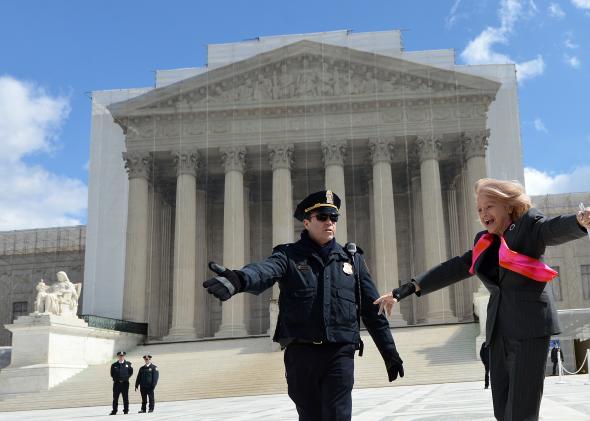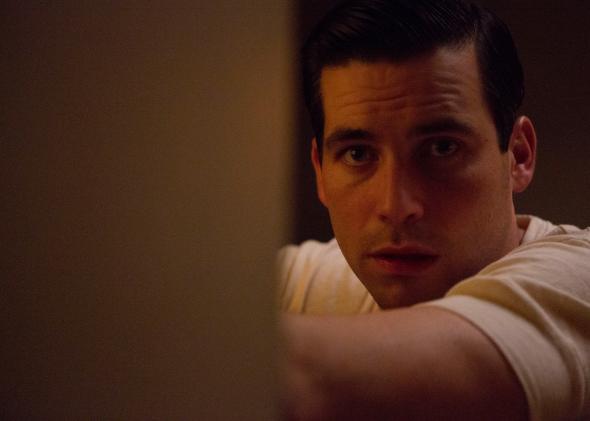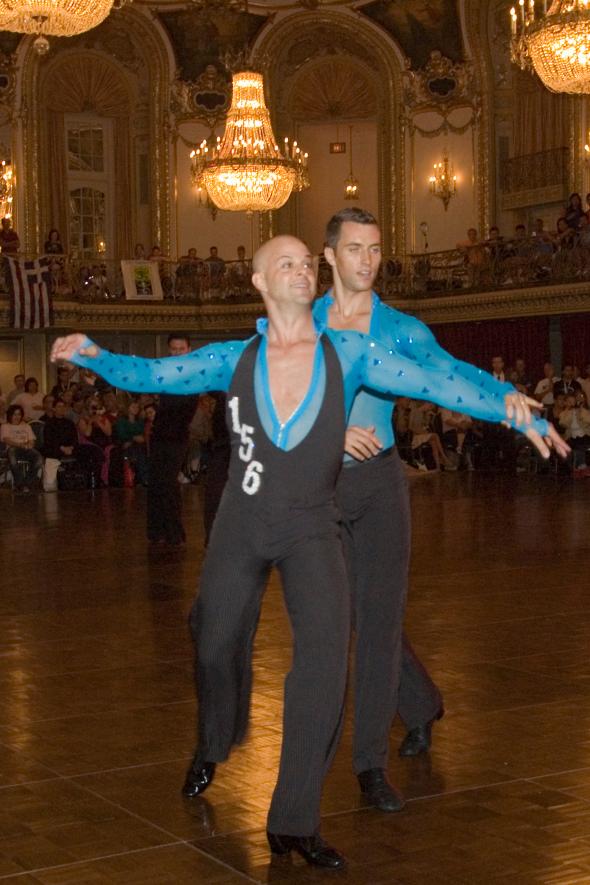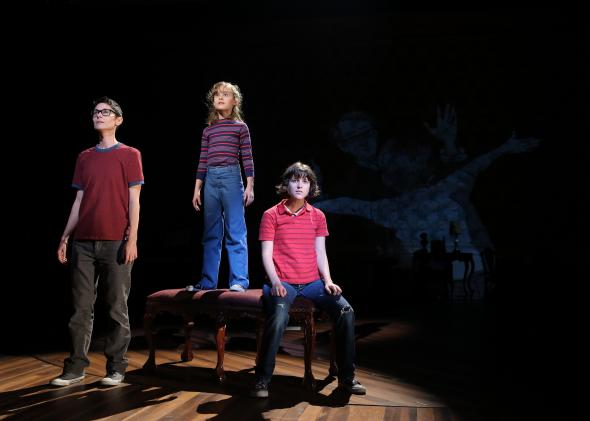From the Courtroom to the Ballroom: The Most Striking Queer Culture of 2013

Photo by Jewel Samad/AFP/Getty Images
Outward asked Slate staffers, Outward contributors, and a smattering of queer luminaries to tell us about most striking piece of LGBTQ culture they experienced in 2013.
Supreme Court argument in the gay marriage cases, recommended by Emily Bazelon, Slate senior editor
It's almost too obvious, and yet: Seeing all the people outside the court, with all the pageantry and banners and cheering—it felt like the world was shifting under my feet, in the best way.
Toronto book launch for Nevada, by Imogen Binnie, recommended by S. Bear Bergman, author of Blood, Marriage, Wine & Glitter
When I found the venue, I discovered that it wasn't just Binnie reading, but four authors, all of them kick-ass trans and two-spirit women. I'm pretty used to turning up and seeing four trans guys on the bill, but never trans women. Imogen, Morgan M. Page, Kiley May, and Trish Salah. It was like hitting the jackpot, and the audience was just borne aloft by their words and talent.
Legendary: Inside the House Ballroom Scene, by Gerard Gaskin, recommended by Samantha Box, photographer.
The culmination of 20-plus years of photography, Legendary is a wonderful look into the house ballroom scene, a culture that has been often been appropriated but rarely acknowledged. Each image captures the beauty and pride of the scene's participants, standing as testimony to the importance of the scene, its endurance and vitality.
The Hollow Crown: Richard II, recommended by Michael Carey
I first want to plug the publications of Circlet Press, purveyor of works of erotic speculative fiction that span every sex and gender combination you can think of and then move on to things you've never imagined. But the single queerest thing I saw this past year was probably the erotic tension between Ben Whishaw and Rory Kinnear in The Hollow Crown: Richard II. The play is at least as homophobic as Merchant of Venice is anti-Semitic, but this particular presentation complicates the text. Richard is shown to be more thoughtful and perceptive than his violent cousin; had he not been enthroned as a child, and manipulated by counselors, he might have been a better king, and Henry knows it. Richard loves Henry, who may well reciprocate, but in their hyper-masculine culture, those feelings only drive him to greater violence.
The demise of the Defense of Marriage Act, recommended by John Culhane, Slate contributor, Widener Law professor, and author of Same-Sex Legal Kit for Dummies
It’s tempting to ask, “What’s left of queer culture, anyway?” But that would be a misdirection from the truth, which is that I don’t know what’s going on. I don’t go to film festivals, watch groundbreaking shows (unless Arrow counts), or even hang out with any A-list gays. In fact, I don’t hang out with the gays much at all these days. So for me, the most important queer event of the year was the striking down of DOMA. Zzz, I know. But this matters very much to my family. That’s the soil I’m planted in these days.
The Fashion Institute of Technology exhibit “A Queer History of Fashion,” recommended by Simon Doonan, Slate contributor, author of The Asylum, and Barneys creative ambassador
Whether wearing it, flogging it, or creating it, the gays are synonymous with fashion. But this masterful exhibit goes so much deeper and darker. From mollies (boozed-up 18th-century dragsters) to scary monocle-wearing literary dykes, this heavenly extravaganza leaves one in no doubt of the fact that we are the chosen people. Please note that my old plaid-bondage trousers—yes, the ones that featured in the “Punk/Chaos” exhibit at the Met earlier this year—are on show yet again!
The Michfest boycott, recommended by Dan Fishback, playwright/musician/director of The Helix Queer Performance Network
For years, activists have boycotted the Michigan Womyn's Music Festival—a "women-only" space that excludes transgender women. This year, trans performer Red Durkin started an online petition to change the policy, and effectively pressured three scheduled acts to cancel, while Indigo Girls and JD Samson both announced that this would be their last appearance until trans women are included. There is still so much transmisogyny to resist, but I was thrilled to see this issue gain visibility and allies this year, bringing us one step closer to a wider queer landscape that respects and values the lives of trans women.
United States v. Windsor, U.S. Supreme Court, June 26, 2013, recommended by Nathaniel Frank, Slate contributor and visiting scholar at Columbia’s Center for Gender and Sexuality Law
I know I know, it's not culture with a capital C. But the ruling is all about the other kind of culture and is nothing if not striking. The decision struck down a 1996 law that sought to “reflect and honor a collective moral judgment” showing national “disapproval of homosexuality.” Seventeen years later, the Supreme Court said its only purpose was “to disparage and to injure” the “personhood and dignity” of gay people. Striking cultural change in 17 short years.
The revival of Queer Nation, recommended by Masha Gessen, author of Words Will Break Cement: The Passion of Pussy Riot (out February 2014), co-editor of Gay Propaganda: Russian Love Stories (also out February 2014)
The old New York ACT UP/Queer Nation sister/brotherhood came out to protest in front of the Russian consulate in New York this summer. My family and I had just decided we needed to leave Moscow, where I'd moved 20 years earlier; we were fleeing the antigay laws. I felt as persecuted and alone as I'd ever felt. Seeing pictures from that protest—people I hadn't seen in two decades—made me feel like my far-away tribe was coming out in my defense. Which is more or less the point of international LGBTQ activism. Amazingly, the reconstituted Queer Nation has stayed on this issue and has had some successes. It's not quite as loud and furious and sexy as it was in 1991—neither are any of us.
The 25th Annual Lambda Literary Awards, June 3, 2013, Cooper Union, New York City, recommended by Nicola Griffith, author of Hild
This was a thrilling evening, a mix of the past, now, and future of queer written culture. Authors, editors, critics, readers, and publishers celebrating 25 years of honoring the words that bring us together—the books that give us a sense of who we are and where we’re going. Three high points: Janis Ian singing “At Seventeen” and making the entire audience weep; trans writers taking the stage and claiming their place in joy and triumph; accepting my own award and feeling as though I was finally home, that I belonged.
The Joey Arias Experience at Joe's Pub, recommended by Daniel Isengart, the subject of Filip Noterdaeme's faux memoir, The Autobiography of Daniel J. Isengart
Joey Arias' way overdue, monthly nightclub residence in New York City, his first since his return from Las Vegas, is a master class in musical sophistication and frivolous banter, infused with a distinctly queer and highly refined sense of style. Facing a very glamorous crowd of cognoscenti, Arias proves again and again that he instinctively understands better than any other performer in the cabaret field what Richard Strauss' favorite librettist, Hugo von Hofmannsthal, said about art: "Depth must be hidden. Where? On the surface."
Olympian Tom Daley’s coming-out video, recommended by Charles Kaiser, author of 1968 in America and The Gay Metropolis.
It’s genuine, heartwarming—and if it makes him happy to be in love with somebody 20 years older than he is, it’s nobody’s damn business but his own!
Two Boys Kissing, by David Levithan, recommended by Dan Kois, Slate senior editor
This lovely young-adult novel about two high-schoolers attempting to break the Guinness record for longest continuous kiss serves as both a state-of-the-gay-teen-nation address for adults, and as a history lesson for those very teens about the generation before theirs, which a malevolent world couldn't succeed in wiping out.

Courtesy of © Giles Keyte/Carnival Film & Television Limited 2012 for MASTERPIECE
Downton Abbey, Season 3, Episode 7, recommended by Chad Lorenz, Slate news editor
When the hate-able schemer Thomas Barrow is canned for making a homosexual pass at a fellow servant, his boss, Mr. Carson, has some harsh homophobic commentary: “I cannot hide that I find your situation revolting. But whether or not you believe me, I am not entirely unsympathetic. You have been twisted by nature into something foul, and even I can see that you did not ask for it.” With a polite one-line reply, Thomas instantly becomes a hero for gay dignity: “I’m not foul, Mr. Carson. I’m not the same as you, but I’m not foul.” Questions of historical accuracy aside, the moment provided a capstone in a season that progressively examined homosexuality, cleverly turning a mirror on present-day attitudes by playing them out within the setting of early 20th-century British aristocracy.
Joe E. Jeffreys and the Drag Show Video Vérité project, recommended by J. Bryan Lowder, Outward assistant editor
It’s easy to think of queer history as a stream of legislative and judicial decisions following Stonewall. But the truth is that many of our greatest achievements have taken and continue to take place not in the marbled halls of power, but in dingy bars and on makeshift stages. Joe E. Jeffreys, a videographer and drag historian, has committed his career to capturing and preserving the vibrant drag and queer performance art scene on film. His occasionally screened documentaries are simultaneously history lessons, joyful celebrations of the camp sensibility, and reminders that the right to work a look is just as important as the right to wed. Here’s Jeffreys' video of drag performer Sahara Davenport, who passed away in October 2012:
Orange Is The New Black, Recommended by Terry Mulcahy, a culture and entertainment journalist in Washington, D.C.
The Netflix Original featured complicated, moving, and funny stories of lesbian and transgender women, which cleverly subverted the women in prison subgenre. It opened conversations about race and sexuality through cheeky satire and brutal honesty and will hopefully pave the way for more nuanced LGBTQ stories on mainstream television.

Photo by Betty Lark Ross for Federation of Gay Games
Same-sex ballroom dancing competition, Paris International Tournament 2013, recommended by Marc Naimark, vice president for external affairs, Federation of Gay Games
These competitions turn a highly gendered activity on its head: When two men or two women dance together, who leads? That alone makes for an entrancing spectacle, as power shifts, is shared, as couples glide across the dance floor.
An Honest Ghost by Rick Whitaker, recommended by Filip Noterdaeme, author of The Autobiography of Daniel J. Isengart
A moving tribute from one fractured and multifarious queer generation to another, Rick Whitaker’s new novel, An Honest Ghost, is also an astonishing literary feat. I read (and reread) An Honest Ghost as a novel, an essay, a poem, and a musical score all at once and was repeatedly dazzled and befuddled by how Whitaker surgically stitched all those genres/voices together. He is the Dr. Frankenstein of American literature, jolting it with electricity, magic, and lots of sparks. It's alive! It's alive!
Scandal, recommended by Alyssa Rosenberg, features editor at ThinkProgress and television columnist at Women And Hollywood
Shonda Rhimes' political soap opera, Scandal, gets much of its attention for the heat around the heterosexual love triangle at its center, composed of crisis fixer Olivia Pope (Kerry Washington), President Fitzgerald Grant (Tony Goldwyn), and First Lady Mellie Grant (Bellamy Young). But I have loved seeing the show reclaim the trope of the manipulative queen, by giving the queen in question, White House Chief of Staff Cyrus Beene (Jeff Perry) real power. Cyrus doesn't scheme because he wants to inhabit a heterosexual life he can't have—he's got his own sexy husband James Novak (Dan Bucatinsky) and an adorable adopted daughter. He schemes because he's a genius, and while the show is blunt about the pain Cyrus feels that his sexuality has kept him from the presidency, he makes chief of staff look like the better, more effective job.
Sophia (Laverne Cox) on Orange Is the New Black, recommended by Hugh Ryan
There's a lot to rave about in Orange Is the New Black, Jenji Kohan's Netflix series about life inside a women's prison, but it is the character of Sophia (a transgender woman of color), played by Laverne Cox (a transgender woman of color), that really excited me, both because it's a story I rarely (if ever) see in mainstream television, and because great roles for transgender actors are so rare.
The 26th Annual MIX Queer Experimental Film Festival and the Killjoy Lesbian Feminist House of Horrors, recommended by Sarah Schulman, author Israel/Palestine and the Queer International
The two highlights for me were spiritual and aesthetic cousins: The 26th annual MIX Queer Experimental Film Festival in Brooklyn and the Killjoy Lesbian Feminist House of Horrors, by Allyson Mitchell and Deirdre Logue, in Toronto. Both events were completely noncommercial; engaged huge numbers of collaborators and hundreds, if not thousands, of participants; were deeply creative and funny; and both celebrated queer past and present through highly committed labor-intensive environmental works. Both pieces inspired and revealed that the queer imaginary still thrives, somewhere under the radar.
The rise of Big Freedia, recommended by Zach Stafford, writer and editor, BOYS
Big Freedia rose to public consciousness in 2013 in the wake of twerking and other black appropriations being showcased all across the mainstream media. The genderqueer performer’s rise is one of the most important queer moments of the year because they unapologetically push against gender, racial, and even musical boundaries, all while being true to themselves. And they are fabulous doing it.
United States v. Windsor, recommended by Mark Joseph Stern, Outward contributor
I have no idea why Justice Anthony Kennedy—who doesn’t particularly care for abortion, voting rights, affirmative action, and myriad other keystones in the arch of American liberalism—decided to become the judicial savior of gay rights. But I am, with some ambivalence, eternally grateful that he did. Kennedy’s opinion in United States v. Windsor, overturning the malicious and anachronistic DOMA, instantly improved the lives of thousands of gay couples. But more importantly, it formalized the legal claims of the gay rights movement with forceful, even majestic eloquence. Already, one state’s gay marriage ban has been slain by Windsor, with another’s soon to fall. Windsor’s immediate impact reversed a single injustice. Its aftershocks will forever change the American gay rights landscape.

Photo by Joan Marcus
Fun Home and The Fosters, recommended by June Thomas, Outward editor
These two very different pieces of art—a musical about the relationship between a butch lesbian and her closeted gay dad, and a TV series about a lesbian couple and their brood of five kids—are both, at heart, about acknowledging how important, but difficult, it is to be honest with the people we love. A good portion of the time I devoted to watching both was spent marveling that such complex, beautiful shows are being made these days.
Erasure, Snow Globe, recommended by Ryan Vogt, Slate copy editor
Gaydom’s favorite synthpop duo (take that, Pet Shop Boys) is out with a new CD just in time for the holidays. What’s it like to listen to an Erasure Christmas album? “I think it's akin to living inside a music box, and I'm the ballerina,” singer Andy Bell told Seattle Gay News. “This music sounds to me like laser beams of sound coming off a glittery disco ball—it's very twinkly and very snowy.” Drop in on the snowy disco music box by checking out the first single, an electrified version of the Latin carol “Gaudete.”
Gay Zen monks, recommended by Rick Whitaker, author of Assuming the Position: A Memoir of Hustling, The First Time I Met Frank O'Hara: Reading Gay American Writers, and, most recently, An Honest Ghost
The gay couple of the year for me was a pair of Zen monks, Robert Chodo Campbell and Koshin Paley Ellison, whose work is focused on being with people who are dying. They’re co-founders of New York Zen Center for Contemplative Care, the first Buddhist organization to offer accredited chaplaincy training in America. Their next end-of-life symposium, in 2014, will address communication and intimacy “because,” as Ellison says, “that’s really the heart of what gets broken in health care, when we take away the intimacy of a moment, of walking into someone’s room and realize that we’re touching someone, that we’re talking to someone, at a moment that really matters.”
